 |
 |
 |
| |
Study Reports No Frequent Reporting of TMC125 Neurological or Psychiatric Events
|
| |
| |
Reported by Jules Levin
8th International Congress on Drug Therapy in HIV Infection, Glasgow, UK, 12-16 November 2006.
B Woodfall, G De Smedt, C Berckmans, B Baeten, M Peeters
Tibotec BVBA, Mechelen, Belgium
TMC125-C203: neuropsychiatric summary
Nervous system disorders occurred in 40% of TMC125-treated patients and 35% of placebo-treated patients.
-- the most common nervous system AEs were headache, dizziness, and insomnia. Only dizziness was more common compared with placebo.
-- Headache, dizziness and insomnia generally occurred within the first month of TMC125 administration.
-- There was no association between TMC125 dose and incidence or severity of nervous system events.
Abstract
Background
TMC125 is a novel NNRTI active against wild-type HIV-1 and HIV-1 resistant to current NNRTIs.
Methods
TMC125-C203 is a 48-week, randomised, blinded, placebo-controlled, dose-escalation trial in three-class-experienced, HIV-1-infected patients. Patients received placebo or TMC125 400mg, 800mg or 1,200mg bid (Phase II formulation), added to an optimised background regimen (OBR) containing at least two other antiretrovirals. The primary objective was to determine the safety and tolerability of TMC125. This analysis focuses on the nervous system and psychiatric events when all patients had been treated for at least 24 weeks.
Results
The trial included 240 patients (66, 57, 74 and 43 patients received placebo, 400mg, 800mg and 1,200mg TMC125 bid respectively). The median age was 42 years and 11% were female. Median treatment duration was 32 weeks.
The incidence of all nervous system events was similar between TMC125 doses and comparable with placebo: 38% with TMC125 vs 35% with placebo.
A grade 3 nervous system event was reported by 1% of TMC125 vs 2% of placebo patients. The most frequently reported nervous system events with TMC125 vs placebo were headache (19% vs 17% respectively), dizziness (10% vs 5% respectively) and insomnia (6% vs 5% respectively).
For the 400mg, 800mg and 1,200mg doses of TMC125, the median onset of
these events was 16, 30, and 28 days respectively and the median duration was 7, 29 and 29 days respectively.
The incidence of psychiatric disorders was similar between TMC125 (13%) and placebo patients (11%). No grade 3 or 4 psychiatric events were reported and
only one patient, in the 400mg group, discontinued for a psychiatric event (confusional state).
The most frequent psychiatric event was depression (4% of TMC125 vs 8% of placebo patients).
Conclusions
The incidence and severity of neuropsychiatric events observed with the 800mg dose of TMC125 was similar to that seen with placebo in this study. Phase III trials with a new formulation of TMC125 with comparable exposure to the 800mg bid Phase II formulation are ongoing.
Neuropsychiatric AEs in TMC125-treated patients:
- were overall not more frequent than placebo
- were generally mild to moderate in severity (ACTG grade 1 or 2)
- generally resolved without intervention
- infrequently led to treatment discontinuation.
These results suggest that the addition of TMC125 to antiretroviral therapy is not
associated with an increase in neuropsychiatric adverse events compared with placebo.
Abstract updated with recent analysis
Introduction
TMC125 is a next generation NNRTI designed to have a high genetic barrier to the development of resistance.1,2
--TMC125 was selected as it maintains activity despite common NNRTI mutations
Data from TMC125-C207, a 7-day, phase IIa, proof of principle trial with functional monotherapy in NNRTI-resistant patients, showed a mean change in log10 viral load of -0.9.3
Data from the 48-week efficacy analysis of the phase IIb trial TMC125-C223 in heavily treatment-experienced patients with substantial NNRTI and PI resistance demonstrated significant and durable efficacy. 4
1. Andries, K et al. Antimicrob Agents Chemother 2004;48:4680-6
2. Vingerhoets J et al. J Virol 2005; 79:12773-82
3. Gazzard BG et al AIDS 2003;17:F48-54
4. Cohen C et al 16th ICAAC 2006 (TUPE0061)
TMC125-C203: study design
TMC125-C203 was a phase II, dose-escalation, double-blind, placebo-controlled trial conducted at 52 sites in Canada and Europe:
-patients were 3-class experienced, each class for at least 3 months
-patients had viral load >1000 c/ml
-the study protocol was reviewed and approved by the appropriate institutional ethics committee and health authorities, and was conducted in accordance with the Declaration of Helsinski
Primary objective: Assess the safety and tolerability of TMC125
TMC125 or placebo plus OBR consisting of:
-- 3-4 ARTs (1-4 NRTIs +/- RTV-boosted lopinavir or saquinavir +/- Fuzeon)
-- use of at least two active drugs (excluding TMC125)
Phase II formulation of TMC125 was administered in this trial:
-- a new formulation with a lower pill burden and smaller pill size is being administered in the ongoing phase III Duet Trial
This sub-analysis focuses on the reported nervous system and psychiatric adverse events (AEs).
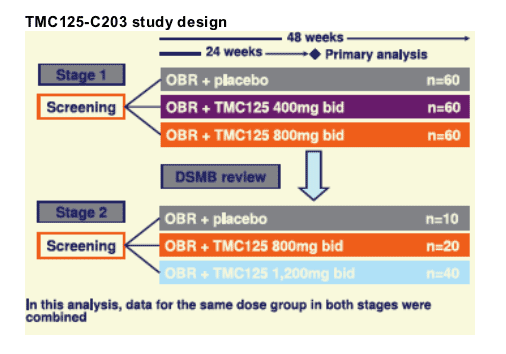
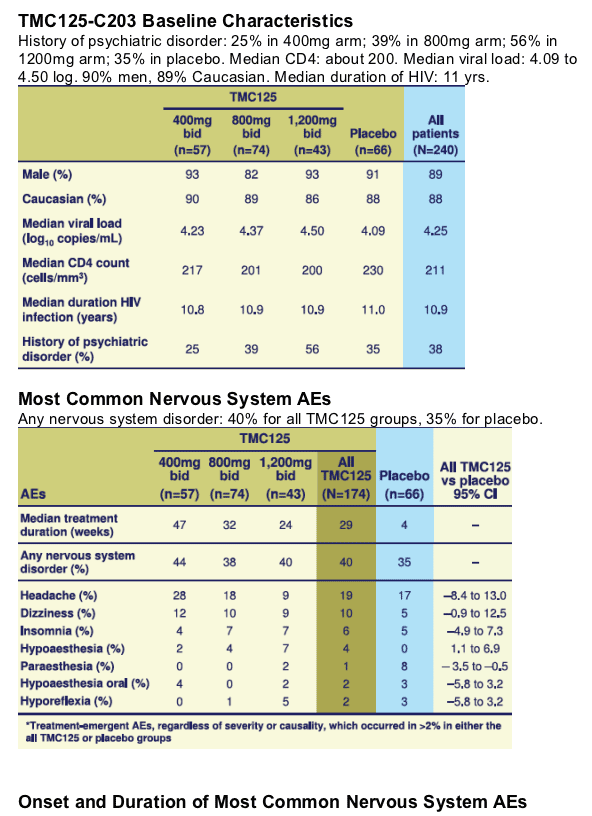
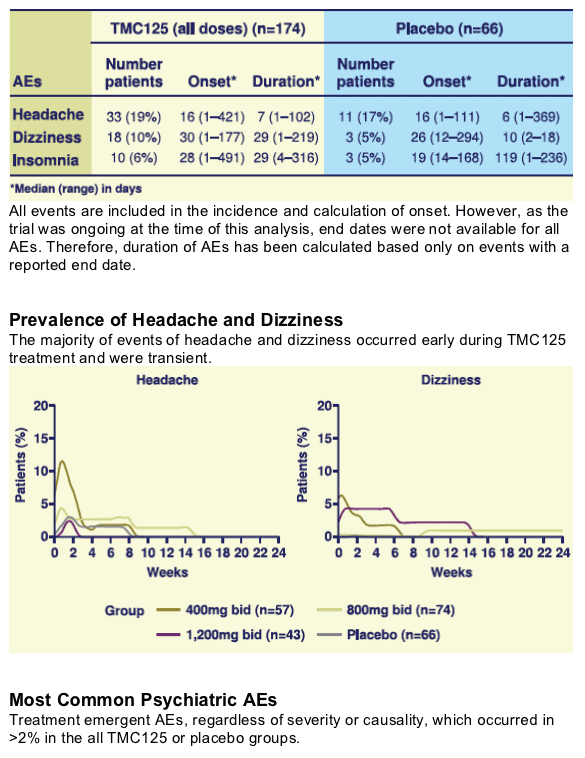
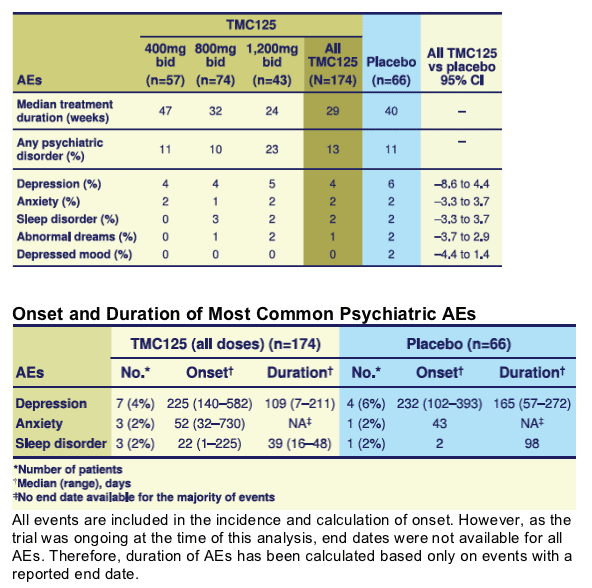

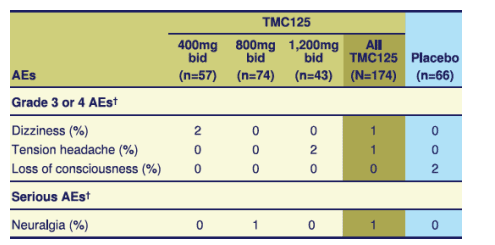
Nervous System and Psychiatric AEs Leading to Treatment Discontinuation
Treatment-emergent AEs, regardless of severity or causality.
Three (2%) patients treated with TMC125 discontinued treatment due to neuropsychiatric AES.
One 53-yr old male patient after 6 days, due to grade 1 headache (probably related to study medication) with grade 2 diarrhea.
One 38-yr old male patient after 9 months treatment, due to grade 1 dizziness (possibly related to study medication) with grade 1 diarrhea and dyspepsia (800mg bid group).
One 56-yr old male patient after 5 days treatment, due to grade 2 confusional state, dizziness, abnormal gait, headache, sweating, hot flushes, increased heart rate and tremor. All events were considered possibly related to study medication; the effect of a ritonavir-boosted PI on the levels of psychotropic medicationb may also have been causal.
--the patient was not receivingf antiretrovirals at baseline, but was taking other medication including venlafaxine, alparazolam, amitriptyline and prochlorperazine
--the dose of venlafaxine was increased just before the start of ART therapy with lopinavir/ritonavir, TMC125 400mg bid, NRTIs and Fuzeon.
|
| |
|
 |
 |
|
|